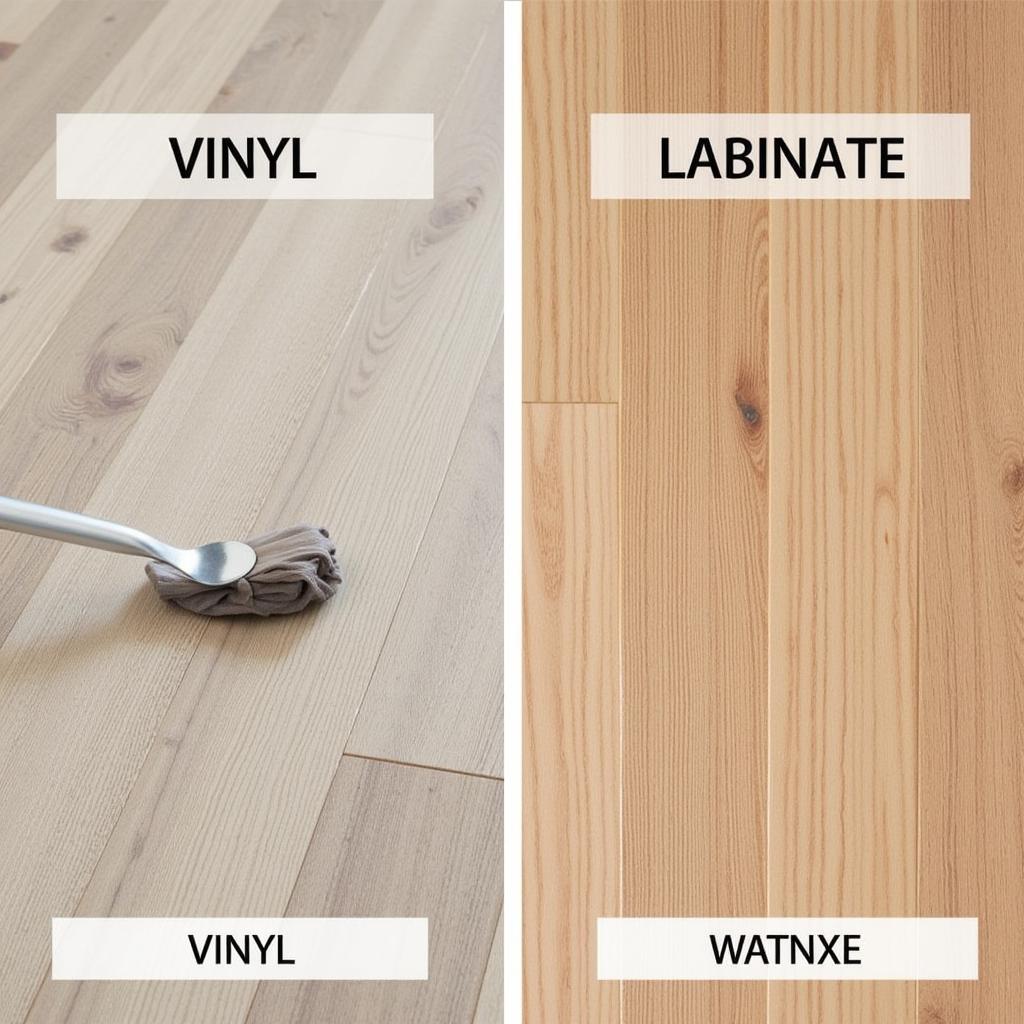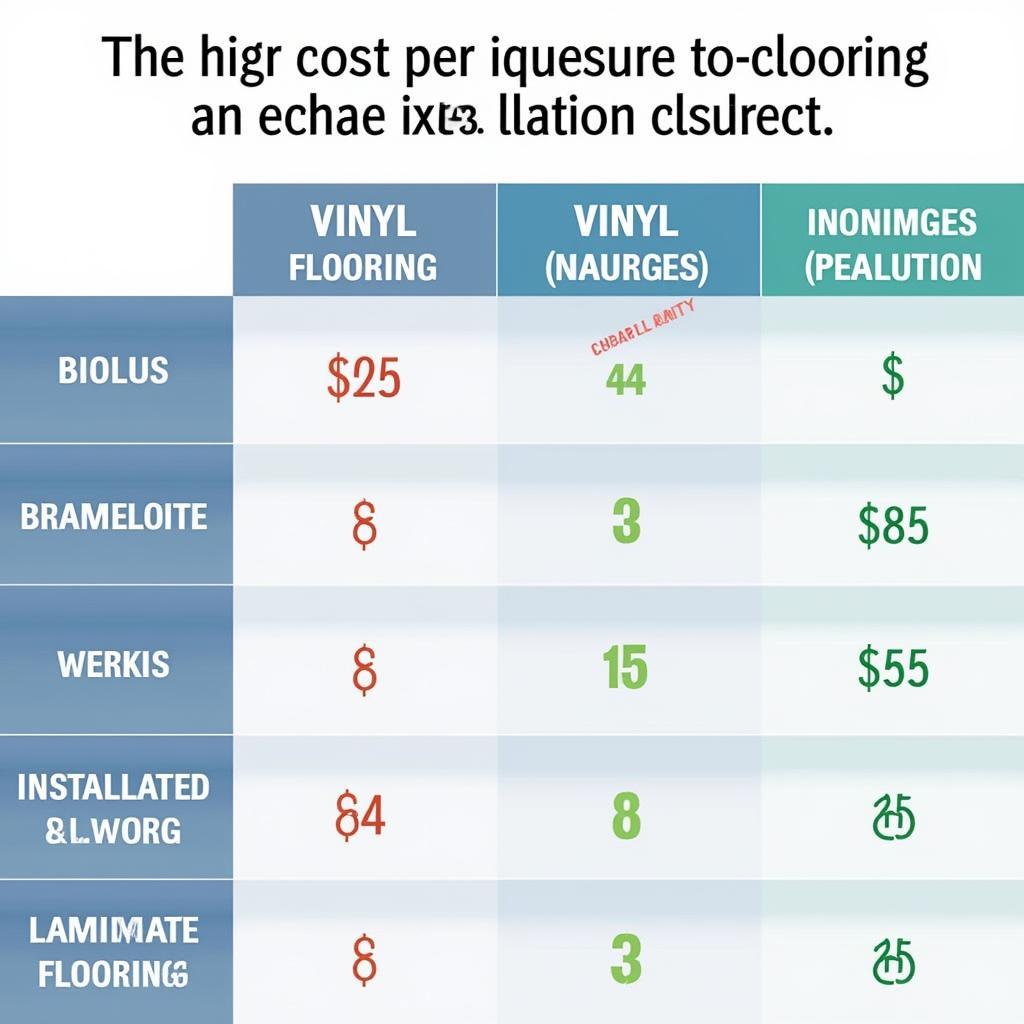Choosing between vinyl and laminate flooring can be tricky. Both are popular, affordable options that mimic the look of hardwood, but they have key differences in composition, durability, and installation. This article will break down the pros and cons of vinyl vs laminate flooring to help you make the informed decision for your home.
Vinyl Flooring: A Deep Dive
Vinyl flooring is made of multiple layers, including a wear layer, design layer, and a core layer made of PVC (polyvinyl chloride). It’s known for its water resistance, making it an excellent choice for kitchens, bathrooms, and basements. Vinyl comes in various forms, including sheets, planks, and tiles.
Pros of Vinyl Flooring
- Water Resistance: Vinyl’s waterproof nature makes it ideal for moisture-prone areas. Spills, pet accidents, and even flooding won’t damage this resilient flooring.
- Durability: With a tough wear layer, vinyl can withstand heavy foot traffic, scratches, and dents, making it a great option for busy households with children and pets.
- Comfort: Vinyl flooring is softer underfoot than laminate, providing a more comfortable walking surface.
- Easy Installation: Depending on the type, vinyl can be relatively easy to install, either with a click-lock system or as peel-and-stick tiles.
- Affordability: Vinyl is typically less expensive than laminate and other flooring options like hardwood.
Cons of Vinyl Flooring
- Susceptibility to Subfloor Imperfections: Vinyl can conform to imperfections in the subfloor, so a smooth, level surface is crucial for proper installation.
- Lower Resale Value: While durable and attractive, vinyl flooring doesn’t typically add as much value to a home as hardwood or even high-quality laminate.
- Potential for Off-Gassing: Some vinyl flooring can emit VOCs (volatile organic compounds), though low-VOC options are increasingly available.
 So sánh sàn vinyl và sàn gỗ laminate
So sánh sàn vinyl và sàn gỗ laminate
Laminate Flooring: Exploring the Benefits and Drawbacks
Laminate flooring is composed of multiple layers, including a wear layer, a decorative layer (printed with a wood or tile image), a core layer made of HDF (high-density fiberboard), and a backing layer. It’s known for its realistic wood look and relatively easy installation.
Pros of Laminate Flooring
- Appearance: Laminate flooring offers a wide variety of styles and colors that convincingly mimic the look of hardwood and even tile at a fraction of the cost.
- Scratch Resistance: The tough wear layer protects laminate from scratches, scuffs, and fading.
- Easy Maintenance: Laminate is easy to clean with regular sweeping and occasional damp mopping.
- DIY-Friendly Installation: Most laminate flooring uses a click-lock system, making it relatively easy to install without professional help.
Cons of Laminate Flooring
- Water Vulnerability: While some laminate flooring is moisture-resistant, it’s not waterproof. Standing water can damage the core layer, causing swelling and warping.
- Noisy: Laminate flooring can be noisy underfoot, especially if not installed with a proper underlayment.
- Difficult to Repair: Damaged laminate planks often require complete replacement rather than repair.
Vinyl vs Laminate: Which is Right for You?
Choosing between vinyl and laminate depends on your individual needs and priorities. Consider the following:
- Budget: Vinyl is generally more budget-friendly than laminate.
- Location: For moisture-prone areas like bathrooms and kitchens, vinyl is the clear winner.
- Durability: Both options offer good durability, but vinyl excels in water resistance while laminate excels in scratch resistance.
- Appearance: Laminate offers a more realistic wood look, while vinyl provides a wider range of design options, including stone and tile looks.
- Installation: Both are relatively DIY-friendly, but some vinyl options (like peel-and-stick) are even easier to install.
 So sánh chi phí sàn vinyl và sàn gỗ laminate
So sánh chi phí sàn vinyl và sàn gỗ laminate
Conclusion: Making the Final Decision on Vinyl vs Laminate Flooring
Ultimately, the choice between vinyl and laminate flooring depends on your specific needs and preferences. By carefully weighing the pros and cons, you can choose the best flooring option for your home and budget. Both vinyl and laminate offer attractive, durable, and affordable flooring solutions, each with its own unique benefits.
FAQ
- What is the lifespan of vinyl flooring?
Vinyl flooring can last for 10-20 years with proper care and maintenance. - Can I install laminate flooring over existing flooring?
In some cases, yes, but it depends on the type of existing flooring and the subfloor condition. - Is vinyl flooring toxic?
Some vinyl flooring can emit VOCs, but low-VOC options are available. - How do I clean laminate flooring?
Regular sweeping and occasional damp mopping is usually sufficient. - What is the best underlayment for laminate flooring?
A foam underlayment can help reduce noise and provide cushioning. - Is vinyl flooring comfortable to walk on?
Yes, vinyl is generally softer underfoot than laminate. - Can I install vinyl flooring in a basement?
Yes, vinyl is an excellent choice for basements due to its water resistance.
Gợi ý các câu hỏi khác, bài viết khác có trong web: “So sánh sàn gỗ công nghiệp và sàn nhựa”, “Cách chọn sàn nhà phù hợp với phong cách nội thất”, “Hướng dẫn thi công sàn vinyl”.
Kêu gọi hành động: Khi cần hỗ trợ hãy liên hệ Số Điện Thoại: 02838172459, Email: truyenthongbongda@gmail.com Hoặc đến địa chỉ: 596 Đ. Hậu Giang, P.12, Quận 6, Hồ Chí Minh 70000, Việt Nam. Chúng tôi có đội ngũ chăm sóc khách hàng 24/7.